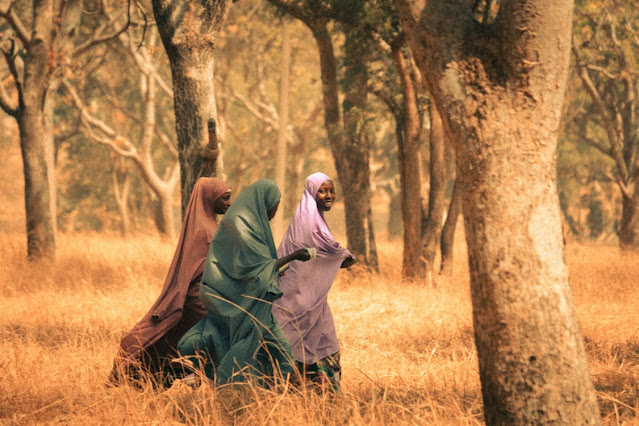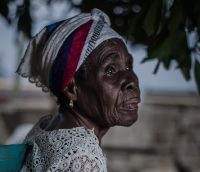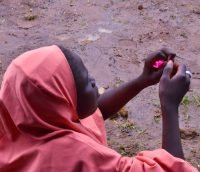
By Adetayo Adetokun
So you are 11…
You are 11, and the world still belongs to you.
You wake with the sun, its golden fingers stretching through the cracks in your mud-brick home, painting patterns on your skin. The air is thick with the scent of wood smoke and fried dough, the sounds of the morning—roosters crowing, water sloshing in basins, and the laughter of your sisters as they prepare for the day. You love mornings. They smell like possibilities.
Today, you will go to school, your bare feet kicking up dust as you run down the narrow path, the weight of your slate pressing against your back. You love the way the teacher’s chalk scratches against the board, and the way the letters dance into meaning beneath your fingers. You dream of writing stories, of learning words big enough to shape the world around you.
But when you return home that evening, something has changed. Your mother’s hands are restless, wringing the edge of her wrapper. Your father sits in the corner, silent, his lips pressed together like a sealed envelope. The air is thick with unsaid things.
Then he speaks.
You are to be married.
The words are strange in your mouth, unfamiliar, foreign. You try to picture what they mean, but all you see is darkness. You shake your head, you protest, but your mother does not meet your eyes. Instead, she speaks of duty, of family, of the things women must do.
That night, you do not sleep. You clutch your slate to your chest as if knowledge itself could shield you. You close your eyes and whisper the names of all the places you will never go.
Outside, the moon watches, silent and unmoved.
—
So you are 15…
You are 15, but childhood is something you only remember in flashes—like a dream half-forgotten.
The first time he climbed on top of you, you thought you would die. The weight of him, the smell of sweat and stale kola nut, the way your small body burned and broke beneath him—it was more than pain. It was erasure.
By 13, you were a mother. By 14, another child. Your body, too young for such burdens, is a ruin. Your breasts sag from feeding, your hips ache, and your skin has lost its softness. Your husband—twice your age, impatient, cruel—no longer looks at you with the satisfaction of ownership. Instead, he looks past you.
You are careful now, quiet. You have learned not to speak unless spoken to, not to cry unless you are alone. The last time you raised your voice, the back of his hand met your cheek so hard that your teeth cut into your tongue, the taste of iron filling your mouth.
Your dreams are smaller now. You no longer dream of books, of school, of the world beyond the dusty walls of your compound. You dream of days without pain. You dream of silence.
Tonight, something inside you twists. The pain is sharp, deep, and unrelenting. You curl up on the floor, pressing your hands to your belly, trying to hold yourself together. You whisper for your mother, though you know she cannot come.
You whisper for the girl you used to be. But she is gone.
—
So you are 19…
You are 19, and you are a ghost.
The woman you once were is barely a shadow, an echo of something forgotten. Your body is a map of suffering, each scar, each mark, each tear a story etched in flesh. The pain has become unbearable. You no longer feel human. You feel as though you are disintegrating from the inside out, your body a hollow shell that no longer remembers its purpose.
He no longer comes to you in the night. He has taken another, younger wife—someone unbroken, untouched, a mirror of the innocence you once had but will never know again.
You remain in the corner, watching as they walk past you, her eyes a reflection of the things you once hoped to be, but never will. Your own eyes are clouded, your skin sagging, the weight of your children and your years pressing down on you, breaking you apart, one piece at a time.
The pain in your abdomen is relentless now. You cannot hide it any longer. It gnaws at you, sharp and cruel. You feel something inside you tearing, ripping apart. You have given birth to too many children, your body is a broken vessel, leaking the remnants of your shattered self.
The doctors say it is vesicovaginal fistula—a complication from childbirth that could have been avoided had anyone cared to help you. They tell you that it’s too late, that there is no cure, that you are a lost cause.
But no one listens.
Your husband doesn’t care. He turns his back on you, sickened by the sight of you. His new wife is young, and her body is untouched, ready to bear him more children, children who will be perfect, children who will never suffer the way you have.
The night becomes your prison.
Your body is falling apart, and no one will save you. You wonder, briefly, if anyone even remembers that you are still alive.
Then the bleeding starts.
You clutch your stomach, the pain curling inside you like fire. The darkness fills your vision, and you can feel the weight of your life draining away, piece by piece.
It is the end.
But even in the depths of the darkness, you wonder what could have been. What would have happened if you had been allowed to grow, to learn, to live.
But that chance is gone now. Gone with the dreams that were stolen from you. Gone with the girl you used to be.
—
So you are 21…
You are 21, and your body is decaying from the inside.
The pain in your belly has been there for months, a deep, gnawing thing that never leaves. You try to explain it to the old midwife, but she only shakes her head. When she finally speaks, her voice is soft with sorrow. Cancer.
You do not understand the word, but you understand the way she looks at you, the way she presses your hands together as if in prayer.
Your husband does not care. You are no longer his concern. You are too sick to work, too weak to scream. He has already moved on, his hands pressing into younger, unbroken flesh.
One night, the pain becomes too much. You curl into yourself, pressing your hands to your belly as if you can hold yourself together through sheer will alone. The room is dark, the air thick with the scent of rot and resignation.
And then, just like that, the pain stops.
You feel light, and weightless, as if you are floating above yourself. You see your body curled on the mat, small, fragile, forgotten. You see the girl you used to be—the one who loved school, who ran in the rain, who dreamed of words big enough to shape the world.
You reach for her, but she is already fading.
Outside, the night is still. The stars flicker, indifferent.
And then, you are nothing.
—
But This Is Not Just Your Story.
This is the story of thousands of girls—married too soon, broken too early, silenced too young. Some survive. Many do not.
Early child marriage is not culture. It is not tradition.
It is a death sentence.
And it must end.





